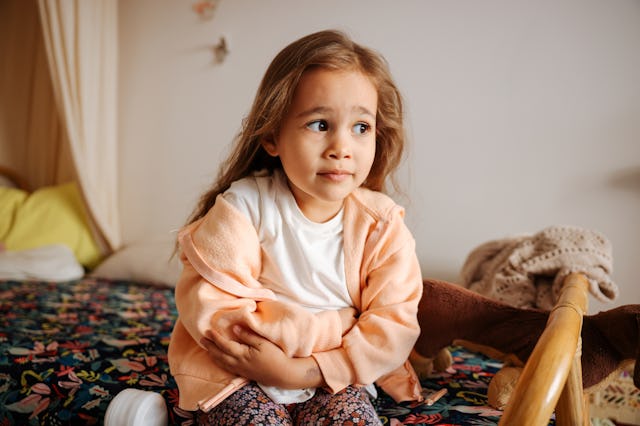3 Surprising Signs Of Anxiety In Kids You Might Be Missing In Yours
Anxiety often manifests differently in children than adults, says pediatric behavioral health expert Dr. Shreya Nagula.

Anxiety rates among children have already increased over the last decade, so it's somewhat safe (and depressing) to assume those rates will keep climbing, thanks in no small part to the last three years. According to current stats, approximately 5.8 million children have anxiety. So, needless to say, if you have a nervous and overwhelmed little one, you're not alone. However, it's not always easy to recognize the signs of anxiety in our kids — and to know when they may need you to reach out to an expert for some guidance. What qualifies as "normal" kid stress? Could your kid's "quirks" be their body and brain's way of signaling they're dealing with more than surface-level anxiousness?
If you suffer from anxiety, you know how scary it can be. However, according to Dr. Shreya Nagula, psychiatrist and pediatric behavioral health medical director at MVP Health Care, anxiety in children can show up differently in kids than in adults.
"Anxiety can show up as stomachaches, headaches, sudden irritability, or trouble breathing," she tells Scary Mommy. "These symptoms can be ever-present at school, where children with anxiety often end up in the nurse's office due to their symptoms. Or come on Sunday night, before school starts again after the weekend. Similarly, children may want to participate in class, but when called on, they freeze up due to anxiety." Maybe not surprisingly, Nagula says these situations often worsen anxiety symptoms over time and might even lead to attempts at avoiding school.
Obviously, it's understandable that you are concerned about whether your child is experiencing these things. If you suspect they might have anxiety but aren't 100% sure, keep an eye out for the following surprising signs of anxiety attacks in kids.
What causes anxiety in kids?
Typically, anxiety is associated with significant life changes and/or stressful situations. For children, says Nagula, anxiety may occur when starting a new school, moving, or joining a new after-school activity. While it is normal for us all to have some fear, nervousness, or even situational anxiety that comes from time to time, Nagula advises that when the anxiety becomes persistent or an overwhelming sense of fear, it is time to seek help.
What are some surprising signs of anxiety attacks in kids?
As mentioned, signs of anxiety present themselves differently in children in adults. And sometimes, these signs can be subtle or significant. If your child exhibits the following, according to Nagula, they might be experiencing anxiety.
1. Dramatic sleep and appetite changes. "Children with anxiety can experience stomach issues, which may manifest as a dramatic shift in their appetite and cause changes in their sleep," Nagula explains. "A little change for children is normal, but parents should pay close attention to a drastic change in sleep and eating habits."
2. Recent social withdrawal and loss of interest in activities previously enjoyed. "Once-active kids may become paralyzed with fear due to anxiety and suddenly quit after-school activities and/ or withdraw from engagements. This may be situational, but it can indicate something larger such as anxiety or depression if it continues or worsens over time," Nagula says.
3. Uncharacteristic irritability. "Anxiety can make children irritable and angry. Parents should monitor for significant changes in behavior that seems uncharacteristic of their child and should try to maintain open communication about these observations," Nagula advises. "Parents can attempt to help their kids understand these emotions and ways to cope with them. If this behavior persists, parents and kids can discuss together whether it's time to seek out professional help."
When should you call a doctor or mental health expert?
If you feel your child is experiencing any of these symptoms suddenly — or if they seem to be worsening — it's a good idea to connect with a healthcare practitioner. Nagula says she encourages parents to seek out help for their child by visiting their pediatrician or a mental health specialist for support. Additionally, if there are any safety concerns, she recommends that parents or kids reach out to the new Crisis and Safety Lifeline by dialing or texting 988.
This article was originally published on